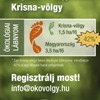 We would like to warmly welcome everyone to a conference regarding various procedures and options of reducing ecological footprint. This conference will be held in Krishna Valley on behalf of the Eco Valley Foundation.
We would like to warmly welcome everyone to a conference regarding various procedures and options of reducing ecological footprint. This conference will be held in Krishna Valley on behalf of the Eco Valley Foundation.
One of the major aims of the conference is to show how it is possible to maintain the ecological footprint of a community within sustainable boundaries. In other words, how one can put sustainability into practice as well as how can a community live and function in an environment-friendly way.
Patron of conference: Gábor Vida, academician
Among the many speakers there are going to be the leaders of Krishna Valley and lecturers, researchers from universities and colleges.
Another point of interest is that we asked four university students to speak on their work concerning achievements in their Eco Valley research.
During the day there also will be workshops in small groups to have the opportunity to speak to Krishna Valley’s specialists in various fields.
Title of Conference: Do your shoes pinch? Change them to a smaller one! Our ecological footprint and sustainability
Date: 15th October, 2009; 9.00 am – 5.00 pm
Venue: Krishna Valley, Somogyvámos
No entry-fee to the conference, but only if you register in advance!
Registrations should be sent to the following email address until 5th October, 2009:
info (at) okovolgy.hu
Necessary data for registration:
Name, email address, occupation, workplace/institute
The programme also includes a free vegetarian meal as well.
Schedule
9.00-9.50 Arrival and registration
10.00 Gábor Vida (member of the Hungarian Academy of Sciences), patron of conference: Inaugural address and opening
10.40 Partha dasa (Manager of Landscaping, Krishna Valley) and Ákos Bede Fazekas (student, University of Corvinus): The importance of eco-villages, local solutions. Studies of the various flora of climate change.
11.00 Radha Kanta dasa (Manager of Agriculture, Krishna Valley) and Csaba Dániel Lánczi (graduate student of University of Eötvös Loránd, Budapest): Sustainable farming, organic farming. The ecological footprint of Krishna Valley.
11.20 Break (scones, herbal tea)
11.40 Premamoya dasa (Head of Education, Krishna Valley) and Réka Tóth (student, University of Pécs): Social sustainability and education. Child upbringing and education in Krishna Valley.
12.00 Radha Krishna dasa (Chairman of Eco Valley Foundation) and Barna Giczi (student, University of Pécs): Buttresses of sustainability. Social sustainability.
12.20 Announcement of afternoon programme
12.30-13.30 Lunch break
13.30-14.30 Workshops: discussions in seven different topics with the leaders of Krishna Valley and other speakers of morning lectures.
(Only one workshop can be attended at a time! All the groups start out from the temple entrance to the various scenes of the eco-valley.)
Available workshops:
1. Eco-villages and the fauna of climate change – Partha dasa and Ákos Bede Fazekas
2. Sustainable farming, ecological footprint – Radha Kanta dasa and Csaba Dániel Lánczi
3. Social sustainability and education – Premamoya dasa and Réka Tóth
4. Buttresses of sustainability – Radha Krishna dasa and Barna Giczi
5. Organic gardening – Sundara Gopala dasa (Head of the gardening department of Krishna Valley)
6. Herbal medication, vegetarianism – Sundari dasi (Manager of social welfare of Krishna Valley)
7. Economic sustainability – Radha Radya dasa (Chief accountant of Krishna Valley)
14.40 Radha Krishna dasa: Introduction of last year achievements of the Eco Valley Program
14.55 Awarding the Eco Valley Prize
15.00 Judit Farkas (University of Pécs): Research experience in the Eco Valley Program
15.15 Ákos Malatinszky (SZIE-KTI): Students pro sustainability – The activities of the past 19 years of GATE Zöld Klub Egyesület (University of Gödöllő, Green Association) from Gödöllő
15.30 Mutual signing of cooperative documentation and speech of cooperative partners
16.30 Gaura Sakti dasa (Head of Krishna Valley): The role of Eco Valley Program in developing sustainable national culture and customs
16.50 Closing words
